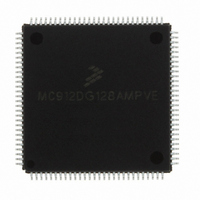MC912DG128AMPVE Freescale Semiconductor, MC912DG128AMPVE Datasheet - Page 59

MC912DG128AMPVE
Manufacturer Part Number
MC912DG128AMPVE
Description
IC MCU 128K FLASH 8MHZ 112-LQFP
Manufacturer
Freescale Semiconductor
Series
HC12r
Datasheet
1.MC912DG128ACPVER.pdf
(478 pages)
Specifications of MC912DG128AMPVE
Core Processor
CPU12
Core Size
16-Bit
Speed
8MHz
Connectivity
CAN, I²C, SCI, SPI
Peripherals
POR, PWM, WDT
Number Of I /o
69
Program Memory Size
128KB (128K x 8)
Program Memory Type
FLASH
Eeprom Size
2K x 8
Ram Size
8K x 8
Voltage - Supply (vcc/vdd)
4.5 V ~ 5.5 V
Data Converters
A/D 16x8/10b
Oscillator Type
Internal
Operating Temperature
-40°C ~ 125°C
Package / Case
112-LQFP
Processor Series
HC912D
Core
HC12
Data Bus Width
16 bit
Data Ram Size
8 KB
Interface Type
CAN/I2C/SCI/SPI
Maximum Clock Frequency
8 MHz
Number Of Programmable I/os
69
Number Of Timers
8
Maximum Operating Temperature
+ 125 C
Mounting Style
SMD/SMT
3rd Party Development Tools
EWHCS12
Minimum Operating Temperature
- 40 C
On-chip Adc
2 (8-ch x 10-bit)
Lead Free Status / RoHS Status
Lead free / RoHS Compliant
Available stocks
Company
Part Number
Manufacturer
Quantity
Price
Company:
Part Number:
MC912DG128AMPVE
Manufacturer:
FREESCALE
Quantity:
2 902
Company:
Part Number:
MC912DG128AMPVE
Manufacturer:
Freescale Semiconductor
Quantity:
10 000
- Current page: 59 of 478
- Download datasheet (4Mb)
3.5.5 Port J
3.5.6 Port K
MC68HC912DT128A — Rev 4.0
MOTOROLA
Setting the RDPH bit in register RDRIV causes all port H outputs to have
reduced drive level. RDRIV can be written once after reset. RDRIV is not
in the address map in peripheral mode. Refer to
Input/Output.
Port J pins are used for key wake-ups that can be used with the pins
configured as inputs or outputs. The key wake-ups are triggered with
either a rising or falling edge signal (KWPJ). An interrupt is generated if
the corresponding bit is enabled (KWIEJ). If any of the interrupts is not
enabled, the corresponding pin can be used as a general purpose I/O
pin. Refer to
Register DDRJ determines whether each port J pin is an input or output.
Setting a bit in DDRJ makes the corresponding bit in port J an output;
clearing a bit in DDRJ makes the corresponding bit in port J an input. The
default reset state of DDRJ is all zeroes.
Register KWPJ not only determines what type of edge the key wake ups
are triggered, but it also determines what type of resistive load is used
for port J input pins when PUPJ bit is set in the PUCR register. Setting a
bit in KWPJ makes the corresponding key wake up input pin trigger at
rising edges and loads a pull down in the corresponding port J input pin.
Clearing a bit in KWPJ makes the corresponding key wake up input pin
trigger at falling edges and loads a pull up in the corresponding port J
input pin. The default state of KWPJ is all zeroes.
Setting the RDPJ bit in register RDRIV causes all port J outputs to have
reduced drive level. RDRIV can be written once after reset. RDRIV is not
in the address map in peripheral mode. Refer to
Input/Output.
Port K pins are used for page index emulation in expanded or peripheral
modes. When page index emulation is not enabled, EMK is not set in
MODE register, or the part is in single chip mode, these pins can be used
Freescale Semiconductor, Inc.
For More Information On This Product,
Pinout and Signal Descriptions
Go to: www.freescale.com
I/O Ports with Key
Wake-up.
Pinout and Signal Descriptions
Bus Control and
Bus Control and
Technical Data
Port Signals
59
Related parts for MC912DG128AMPVE
Image
Part Number
Description
Manufacturer
Datasheet
Request
R
Part Number:
Description:
Manufacturer:
Freescale Semiconductor, Inc
Datasheet:
Part Number:
Description:
Manufacturer:
Freescale Semiconductor, Inc
Datasheet:
Part Number:
Description:
Manufacturer:
Freescale Semiconductor, Inc
Datasheet:
Part Number:
Description:
Manufacturer:
Freescale Semiconductor, Inc
Datasheet:
Part Number:
Description:
Manufacturer:
Freescale Semiconductor, Inc
Datasheet:
Part Number:
Description:
Manufacturer:
Freescale Semiconductor, Inc
Datasheet:
Part Number:
Description:
Manufacturer:
Freescale Semiconductor, Inc
Datasheet:
Part Number:
Description:
Manufacturer:
Freescale Semiconductor, Inc
Datasheet:
Part Number:
Description:
Manufacturer:
Freescale Semiconductor, Inc
Datasheet:
Part Number:
Description:
Manufacturer:
Freescale Semiconductor, Inc
Datasheet:
Part Number:
Description:
Manufacturer:
Freescale Semiconductor, Inc
Datasheet:
Part Number:
Description:
Manufacturer:
Freescale Semiconductor, Inc
Datasheet:
Part Number:
Description:
Manufacturer:
Freescale Semiconductor, Inc
Datasheet:
Part Number:
Description:
Manufacturer:
Freescale Semiconductor, Inc
Datasheet:
Part Number:
Description:
Manufacturer:
Freescale Semiconductor, Inc
Datasheet:











